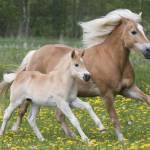Vitamin C in Growing and Mature Horses

Vitamin C’s well-publicized role as a powerful antioxidant overshadows the many other functions it has in the body.
Perhaps the most important role of vitamin C for the growing horse is its function in collagen synthesis and repair. Collagen is the tough, fibrous intercellular material that is the principal component of skin and connective tissue, the organic substance of bones and teeth, and the ground substance between cells. Without collagen synthesis to strengthen the extracellular matrix and cross-link tissue fibers, proper growth is not possible. Vitamin C is also important in energy production, and hormone and amino acid synthesis.
The antioxidant action of vitamin C takes place in intra- and extracellular chemical reactions. This ability to work both inside and outside the cell is due to the vitamin’s water-soluble nature and because it is distributed throughout the body in various fluids. If oxidants are not reduced by ascorbate, a mineral salt of vitamin C, they can affect DNA transcription or damage DNA, protein, or membrane structures. Therefore, ascorbate may have a central role in cellular oxidant defense because uncontrolled oxidation in the body could affect growth and development. Ascorbate can also transfer electrons to tocopherol radicals (reduced vitamin E) in lipid particles or membranes, essentially helping to recycle vitamin E.
Vitamin C deficiency is not normally observed in horses because they can synthesize ascorbic acid from glucose in the liver, an ability that humans and some other animals do not share. Supplemental vitamin C for the horse has not been found to affect blood levels unless it is given in very large amounts. However, production of vitamin C in the liver can be limited by some conditions such as rapid growth or stressful situations. Daily supplementation of vitamin C may be beneficial during dietary deficiencies of energy (in particular glucose and glucose substrates), protein, vitamin E, selenium, and iron; performance for competition; periods of fast growth; transportation; a change of environment; disease (bacterial and viral infections); and parasitic infection. No toxic levels of vitamin C intake have been observed in the horse.








